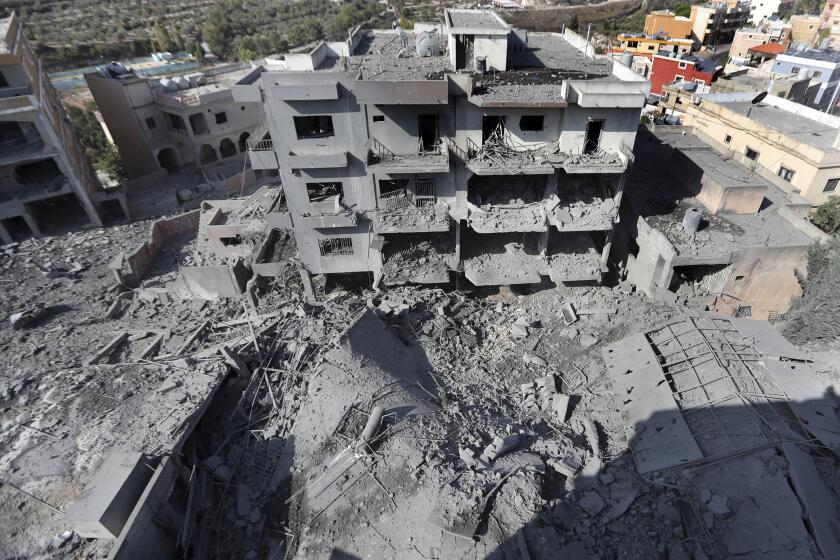Inquiry Into Madrid Cell Provides a View of Al Qaeda’s Wide Reach
In the labyrinthine world of Al Qaeda, it’s not unusual to fly to another country for a meeting or even to pick up an identity document. Terrorists depend on a support infrastructure across the globe.
Police say Imad Eddin Barakat, a moon-faced Syrian immigrant accused of playing a support role in the Sept. 11 plot, commanded such a structure in Spain.
A six-year police probe indicates the Madrid group stood out among European cells because of unusually extensive ties to Al Qaeda leaders and operations worldwide. The case has opened a window into the workings of Al Qaeda--and possibly the preparations for the Sept. 11 attacks.
Barakat, 38, came to Madrid in 1986. He married a Spaniard and became a naturalized Spanish citizen, a pattern repeated by half a dozen fellow suspects from his hometown of Aleppo. Barakat’s group has longtime connections to Syrian suspects in Germany who were close to the Hamburg cell.
The Spanish suspects are shop owners, car salesmen, traders in textiles and food products. They speak Spanish with the verve and informality of natives and were readily accepted by middle-class Spanish neighbors and co-workers. Although Barakat’s wife converted to Islam and wears traditional garb, the Spanish wife of another suspect is a Catholic lawyer and works in a government ministry.
During an interrogation by veteran investigative magistrate Baltasar Garzon, Barakat described himself: “I work everything: clothes, cars, honey, rugs, whatever turns up. I’m a free merchant; I don’t have one thing.”
Barakat, a father of five, was hefty, loud, always hustling. He drove around in whatever new or used car he was peddling. He hawked trunk loads of leather jackets and imitation Lacoste shirts outside a gleaming Saudi-built mosque here.
Barakat was arrested in November and remains in jail along with 14 others. Defense lawyers say the charges filed by Garzon, who is renowned for prosecuting dictators and terrorists, are politically motivated. Skeptics in Madrid’s Arab community say the idea of Barakat as a terrorist kingpin clashes with their memory of a used-car salesman.
“He moves in commerce, he has many contacts, he talks a lot,” said Riay Tatari Bakri, director of the Union of Muslim Communities of Spain and an official at the Abu Bakr mosque where Barakat worshiped. “In my judgment, a normal person.”
Barakat, whose conduct seems alternately streetwise and careless, lived beyond his apparent means. He is part-owner of a now-shuttered retirement home for senior citizens outside Madrid; curious neighbors there said the place had a large Arab staff and not many old folks. Barakat also helped bankroll construction projects. He lived in an apartment on the top floor of a middle-class condo complex.
His cell allegedly used real estate and construction companies and Islamic charities to distribute an estimated $2.2 million to extremists in locales ranging from the U.S. to the Balkans to Yemen. And Barakat traveled tirelessly: Britain, Germany, Turkey, Italy, Indonesia, Jordan, Syria, the United Arab Emirates. Not the itinerary of a rug merchant, police say, but of an influential extremist involved in strategy, finance and logistics.
“Listen, all these many trips you have made around practically half the world are related to your work?” Garzon asked, according to a transcript obtained by The Times.
“Ninety percent of them yes, some no, some for a visit or friendship or something,” Barakat responded.
Since 1996, Barakat has gone more than 20 times to London, the hub of Al Qaeda in Europe. He told the judge he chose cheap flights--”only $77 round-trip.” In London, he stayed with his friend Abu Qatada, a cleric regarded as Al Qaeda’s spiritual leader outside Afghanistan. Police found a copy of Barakat’s passport in Abu Qatada’s home.
“Abu Qatada was like a godfather who oversaw” the terrorist network in Europe, a Spanish police commander said. “Barakat was more operational.”
Despite the Madrid cell’s significance, police say, they have not deciphered tantalizing links to Sept. 11. For example: Barakat’s phone number was found in the papers of Said Bahaji, a fugitive former roommate of hijacker Mohamed Atta.
Barakat insists he did not know Bahaji or Atta. He denies that he discussed the airborne attacks in advance during wiretapped phone calls in August 2001 with an unidentified suspect in London named Shakur.
In an Aug. 27 call, Shakur told Barakat in a secretive tone he was taking classes that would last about a month and that “in the classes, we have entered into the field of aviation and we have even cut the bird’s throat.”
Barakat admitted the conversations were in code but said he didn’t know what Shakur meant with his talk.
“Shakur is key,” a Spanish law enforcement official said. The conversations suggest Barakat was a mentor to Shakur, the official said. Investigators are convinced that Shakur, believed to be a Moroccan extremist, was aware of the plot.
Some investigators believe the Sept. 11 hijackers kept their distance from the Madrid cell and the rest of the European network to ensure maximum security. Others allege that Barakat’s cell played a support role, perhaps even recruiting plotters and setting up an important meeting that Atta held on the coast near Tarragona.
Police think that meeting in July 2001 took place in a safe house and required local assistance. Police are looking for a mysterious Algerian who had lived in the beach town that Atta visited; the Algerian later accompanied Bahaji when he escaped Hamburg for Karachi days before the attacks.
Spanish police in April made a find that suggests the Madrid cell may have conducted reconnaissance in the United States. Police serving a search warrant found startling videos of the World Trade Center taped by Ghasoub al-Abrash Ghalyoun, an associate of Barakat and Muhamed Galeb, the cell’s alleged finance boss.
Two of the five videos that Al-Abrash shot in August 1997 were devoted to the trade center towers, inside and out. He also took extensive footage of potential targets: the Golden Gate Bridge, the Brooklyn Bridge, the Sears Tower, Universal Studios, Disneyland and a New York airport.
In his narration, he referred to other people who would look at the tapes and to his fear of getting caught, giving the impression that he was a scout, police said. The tapes show suspected U.S. members of the Muslim Brotherhood with him.
Four months after Al-Abrash returned, one of his close associates met in the town of Castellon with an alleged courier for Osama bin Laden, according to investigators. Police are investigating whether the courier received copies of the tapes from the associate or Al-Abrash himself. Al-Abrash was arrested in July.
The accused courier, Mohamed Baiah, lived in Turkey and allegedly traveled between Afghanistan and Europe. He was one of many holy warriors who found refuge at Barakat’s Madrid apartment, according to police.
Asked about his hospitality to desperados, Barakat blamed his faith.
“We have a thing, we Muslims or Arabs,” Barakat told the judge. “In the mosque, I see a guy whom I don’t know.... If he asks, can he sleep in my house one or two days, I might let him. It’s a very normal thing in our countries.”
More to Read
Sign up for Essential California
The most important California stories and recommendations in your inbox every morning.
You may occasionally receive promotional content from the Los Angeles Times.










